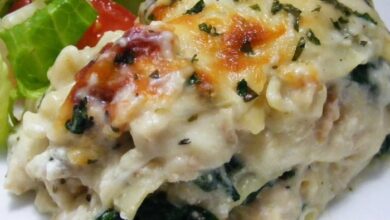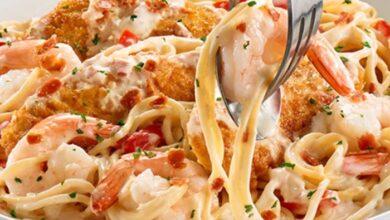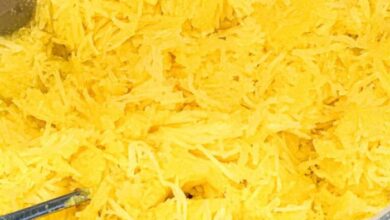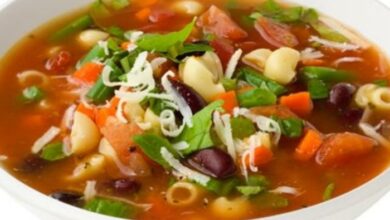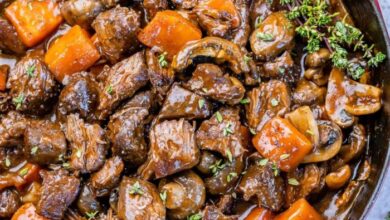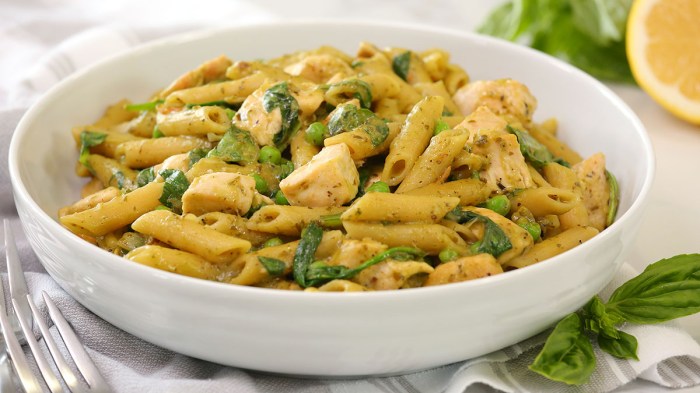
Pesto Chicken Penne Casserole: A Flavorful and Easy Weeknight Meal
Pesto chicken penne casserole is a comforting and flavorful dish that brings together the best of Italian cuisine. This one-pan wonder is perfect for busy weeknights, as it’s easy to prepare and packed with delicious flavors. The creamy pesto sauce coats the tender chicken and perfectly cooked penne pasta, creating a symphony of textures and tastes.
But this casserole is more than just a simple meal; it’s a canvas for creativity, allowing you to customize it to your liking.
Imagine the aroma of fresh basil filling your kitchen as you prepare this dish. The vibrant green pesto, made with a blend of herbs, nuts, and Parmesan cheese, adds a burst of flavor that elevates the entire casserole. You can experiment with different types of pesto, like sun-dried tomato or arugula, to create unique flavor profiles.
And if you’re looking for a protein alternative, you can easily swap out the chicken for shrimp, sausage, or even tofu.
Pesto Chicken Penne Casserole: A Flavorful Fusion
This hearty casserole is a delightful combination of creamy pesto sauce, tender chicken, and al dente penne pasta, baked to perfection. It’s a dish that satisfies both the palate and the soul, offering a symphony of flavors and textures. The vibrant pesto sauce, with its basil, pine nuts, and Parmesan cheese, adds a touch of Italian sunshine, while the chicken provides a satisfying protein punch.
The versatility of this dish allows for endless customization, making it a perfect option for any occasion.
Origins and Inspiration
The inspiration for this recipe stems from the rich culinary traditions of Italy and the Mediterranean region. The dish draws inspiration from the classic Italian pasta dish, “Penne al Pesto,” which features penne pasta tossed in a flavorful pesto sauce.
The addition of chicken and the casserole format adds a modern twist, making it a hearty and satisfying meal.
The Culinary History of Penne Pasta, Pesto Sauce, and Chicken
Penne Pasta
Penne pasta, with its distinctive quill-like shape, originated in the 15th century in Italy. The name “penne” derives from the Italian word for “quills,” referring to the writing instruments used by scribes in the Middle Ages. Penne pasta is a versatile ingredient, well-suited for various sauces and preparations.
Its unique shape allows it to hold sauces effectively, enhancing the overall dining experience.
Pesto Sauce
Pesto, a vibrant green sauce, has roots in the Ligurian region of Italy. Its origins can be traced back to the 19th century, when fishermen in the region would create a simple sauce using basil, garlic, olive oil, and pine nuts to preserve their catch.
The sauce, known as “pesto alla genovese,” quickly gained popularity and became a staple of Italian cuisine.
Pesto chicken penne casserole is a comforting dish that’s perfect for a weeknight meal. It’s packed with flavor and easy to assemble, but sometimes I crave something a little lighter and more vibrant. That’s when I turn to grilled asparagus steak bundles, like the ones featured on Cerita Kuliner.
The smoky char of the grilled asparagus and steak pairs beautifully with the creamy pesto sauce in the casserole, making for a satisfying and delicious meal.
Chicken
Chicken has been a staple food source for centuries, with its origins dating back to ancient times. It has been domesticated for its meat and eggs, playing a significant role in various culinary traditions worldwide. Chicken is a versatile ingredient, adaptable to a wide range of cuisines and cooking styles.
Pesto chicken penne casserole is a delicious and easy weeknight meal, but sometimes I crave something a little different. That’s when I turn to my trusty easy pizza sauce i recipe. It’s so versatile and can be used for everything from pizza to pasta dishes, so it’s always a good idea to have some on hand.
When I’m feeling adventurous, I’ll even use it as a base for my pesto chicken penne casserole, adding a touch of Italian flair.
Ingredients and Variations
This delectable casserole is a symphony of flavors, and understanding the role of each ingredient is crucial for achieving that perfect balance. Let’s delve into the components that make this dish so special and explore how you can personalize it to your liking.
Essential Ingredients
The foundation of this dish is a simple yet effective combination of ingredients:
- Penne Pasta:The classic choice for this casserole, penne’s ridges provide a perfect surface for clinging to the creamy pesto sauce and chicken. You can experiment with other pasta shapes, like rigatoni or farfalle, for a different texture.
- Chicken:The protein source, chicken adds a hearty and flavorful element to the casserole. You can use cooked chicken breasts, thighs, or even rotisserie chicken for convenience.
- Pesto:The star of the show, pesto brings a vibrant and herbaceous flavor that elevates the dish. We’ll explore the world of pesto variations in detail below.
- Cream Cheese:This adds a rich, creamy texture and helps to bind the casserole together.
- Mozzarella Cheese:Melted mozzarella provides a gooey, cheesy topping that complements the flavors of the casserole.
- Parmesan Cheese:This adds a sharp and salty note, enhancing the overall flavor profile.
- Garlic:A key component in many Italian dishes, garlic adds a pungent and savory aroma to the casserole.
- Salt and Pepper:These essential seasonings bring out the flavors of the other ingredients and help to balance the dish.
Pesto Types and Flavor Profiles
Pesto is a versatile sauce that can be customized with different ingredients to create unique flavor profiles. Here are some popular pesto variations:
- Classic Basil Pesto:The most traditional type, made with fresh basil, pine nuts, Parmesan cheese, garlic, and olive oil. This pesto has a bright, herbaceous flavor with a slightly nutty undertone.
- Sun-Dried Tomato Pesto:A savory option, this pesto features sun-dried tomatoes, which add a sweet and tangy note to the mix.
- Spinach Pesto:This pesto offers a slightly milder flavor than basil pesto, with a subtle earthy taste.
- Arrabbiata Pesto:For those who like it spicy, this pesto includes red pepper flakes for a fiery kick.
- Walnut Pesto:This pesto uses walnuts instead of pine nuts, providing a richer and earthier flavor.
Alternative Protein Options
While chicken is the classic choice, this casserole is adaptable and can be enjoyed with various protein sources:
- Shrimp:A delicious and light option, shrimp adds a delicate seafood flavor to the casserole.
- Sausage:Italian sausage, either sweet or spicy, provides a hearty and flavorful alternative to chicken.
- Ground Beef:A budget-friendly option, ground beef adds a savory and satisfying element to the dish.
- Vegetables:For a vegetarian option, you can omit the protein entirely and add extra vegetables like mushrooms, spinach, or roasted peppers.
Ingredient Substitutions
This casserole can be easily adapted to suit dietary restrictions or preferences:
- Dairy-Free:Replace cream cheese with a dairy-free alternative, and use vegan cheese for the mozzarella and Parmesan.
- Gluten-Free:Use gluten-free penne pasta.
- Nut-Free:If you’re allergic to nuts, replace pine nuts with sunflower seeds or pepitas in the pesto.
Cooking Techniques and Steps: Pesto Chicken Penne Casserole
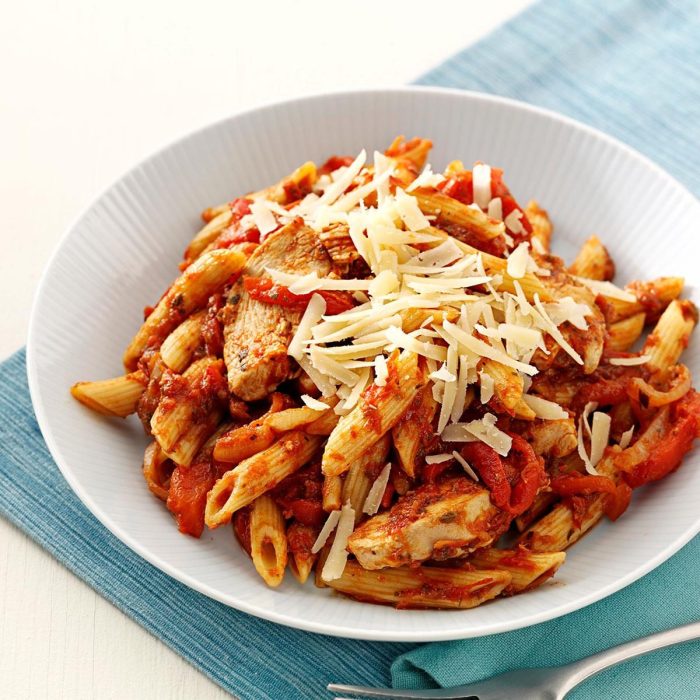
This section will provide a step-by-step guide for preparing this flavorful dish. We will cover all the essential stages, from preheating the oven to baking the casserole, ensuring a seamless and delicious experience.
Preheating the Oven and Preparing the Chicken
Preheating the oven to 375°F (190°C) is the first step, as it ensures the casserole cooks evenly and develops a golden-brown crust. While the oven preheats, prepare the chicken by cutting it into bite-sized pieces. This allows for faster and more even cooking.
Cooking the Pasta
Cooking the penne pasta according to the package directions is crucial. Al dente pasta, which is firm to the bite, is ideal for this casserole, as it will not become mushy during baking.
Making the Pesto Sauce
This recipe calls for store-bought pesto sauce, which simplifies the process. However, if you prefer homemade pesto, you can easily make it with fresh basil, pine nuts, garlic, Parmesan cheese, and olive oil.
Assembling the Casserole
Once the pasta is cooked and drained, toss it with the pesto sauce, ensuring each strand is coated. Next, add the cooked chicken and any additional vegetables you might be using.
Baking the Casserole
Transfer the mixture to a greased 9×13 inch baking dish and spread it evenly. Sprinkle with shredded mozzarella cheese, which melts beautifully and adds a creamy, cheesy flavor. Bake for 20-25 minutes, or until the cheese is melted and bubbly, and the casserole is heated through.
Tips and Tricks
- To enhance the flavor, consider adding a pinch of red pepper flakes to the pesto sauce for a subtle kick.
- If you want a richer, creamier texture, add a cup of ricotta cheese to the casserole mixture.
- To make the casserole ahead of time, assemble it and cover it with foil. Refrigerate for up to 24 hours. Before baking, remove the foil and bake as directed.
Serving and Presentation
Pesto chicken penne casserole is a dish that’s as visually appealing as it is flavorful. Serving it correctly can elevate the dining experience, making it a memorable meal for your guests. Here’s how to present this delectable dish:
Serving Temperature
The ideal serving temperature for this casserole is warm, allowing the flavors to fully develop and the cheese to be melted and gooey. The casserole should be heated through but not overly hot. It’s best to serve it immediately after reheating to maintain its optimal texture and temperature.
Plating Techniques
A simple yet elegant presentation is key to showcasing this flavorful casserole. Individual portions can be served in shallow bowls or on plates, allowing the vibrant colors of the pesto, chicken, and penne to shine through. A generous portion of the casserole should be placed in the center of the plate, leaving some space around it for garnishes.
Garnishes and Accompaniments
Garnishes and accompaniments can enhance the flavors and visual appeal of the pesto chicken penne casserole. Here are some suggestions:
- Freshly grated Parmesan cheese:A sprinkle of Parmesan cheese adds a salty and nutty flavor, complementing the richness of the casserole.
- Chopped fresh basil leaves:A few sprigs of fresh basil add a burst of freshness and aroma, enhancing the pesto flavor.
- Crushed red pepper flakes:A pinch of red pepper flakes adds a touch of heat, balancing the richness of the dish.
- A drizzle of extra virgin olive oil:A drizzle of olive oil adds a touch of richness and shine to the casserole.
Table Setting
A simple and elegant table setting complements the rustic charm of the pesto chicken penne casserole. Here’s how to create a cohesive look:
- Dinnerware:Choose white or cream-colored dinnerware to create a neutral backdrop for the colorful casserole. Rustic ceramic plates with a slightly textured finish can add a touch of warmth and sophistication.
- Tablecloth:A linen tablecloth in a neutral color, such as beige or ivory, provides a classic and elegant foundation for the table setting.
- Napkins:Choose linen napkins in a complementary color, such as a soft green or a deep red, to add a pop of color and texture.
- Centerpiece:A simple centerpiece, such as a vase with fresh herbs or a bowl of colorful fruits, adds a touch of freshness and visual interest.
Flavor Combinations and Pairings
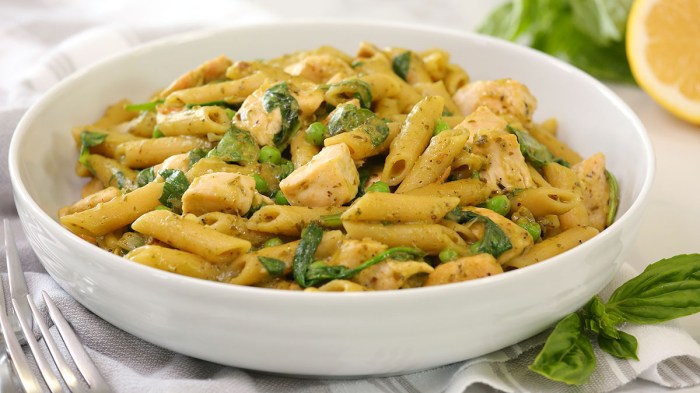
Pesto Chicken Penne Casserole offers a canvas for culinary creativity, allowing you to explore various flavor combinations and pairings that complement the rich, savory base. By experimenting with different pesto flavors, incorporating complementary ingredients, and selecting appropriate wines or beverages, you can elevate this dish to new heights of deliciousness.
Pesto Variations
The foundation of this casserole lies in the pesto, and its flavor profile can be significantly altered by using different herbs and ingredients.
Pesto chicken penne casserole is a comforting dish that’s always a crowd-pleaser, especially when paired with a creamy side like chef johns creamy corn pudding. The sweet corn and rich sauce complement the savory pesto and chicken perfectly, making for a satisfying and balanced meal.
Next time I make this casserole, I’ll be sure to add a dollop of that creamy corn pudding on top for an extra layer of deliciousness.
- Basil Pesto:The classic choice, basil pesto delivers a bright, herbaceous flavor that complements the chicken and penne perfectly.
- Sun-dried Tomato Pesto:Sun-dried tomatoes add a sweet and savory note to the pesto, creating a more complex flavor profile.
- Arugula Pesto:Arugula pesto offers a slightly peppery and pungent flavor, adding a unique twist to the casserole.
Complementary Flavors
Beyond the pesto, various ingredients can be added to enhance the flavor and texture of the casserole.
- Roasted Vegetables:Roasted vegetables like bell peppers, zucchini, or eggplant add sweetness, color, and a delightful textural contrast to the casserole.
- Cheese:Adding cheese, such as mozzarella, Parmesan, or ricotta, provides a creamy, melty element that elevates the richness of the casserole.
- Herbs:Fresh herbs like thyme, rosemary, or oregano can be incorporated into the casserole to enhance its aromatic profile.
Wine and Beverage Pairings
Selecting the right beverage to accompany your Pesto Chicken Penne Casserole can significantly enhance the dining experience.
- White Wine:A crisp, dry white wine, such as Sauvignon Blanc or Pinot Grigio, pairs well with the bright flavors of the pesto and the richness of the chicken.
- Red Wine:A light-bodied red wine, such as Pinot Noir or Beaujolais, can complement the dish’s savory notes and the sweetness of the roasted vegetables.
- Sparkling Wine:A sparkling wine, such as Prosecco or Cava, can add a touch of effervescence and acidity that cuts through the richness of the casserole.
Health and Nutritional Aspects
Pesto chicken penne casserole, while undeniably delicious, can be a hearty and calorie-rich dish. Understanding its nutritional profile and making informed choices about ingredients can help you enjoy this dish while maintaining a balanced diet.
Nutritional Content Analysis
The nutritional content of pesto chicken penne casserole varies depending on the specific recipe and ingredients used. However, a typical serving might contain approximately:* Calories:500-600
Protein
25-30 grams
Carbohydrates
50-60 grams
Fats
20-25 grams
Health Benefits of Ingredients, Pesto chicken penne casserole
The ingredients in pesto chicken penne casserole offer a range of health benefits:* Chicken:A good source of lean protein, essential for muscle building and repair. Chicken is also rich in B vitamins, selenium, and phosphorus.
Penne Pasta
Provides carbohydrates for energy. Choosing whole-wheat penne offers additional fiber, which aids digestion and promotes satiety.
Pesto
Made with fresh basil, pine nuts, Parmesan cheese, garlic, and olive oil. Basil is a good source of vitamin K, which is important for blood clotting and bone health. Pine nuts are rich in healthy fats and protein. Parmesan cheese provides calcium for strong bones.
Garlic is known for its antimicrobial properties and potential health benefits for the heart. Olive oil is a source of monounsaturated fats, which are beneficial for heart health.
Vegetables
Adding vegetables like spinach, broccoli, or tomatoes increases the nutritional value of the casserole. These vegetables provide vitamins, minerals, and antioxidants.
Tips for Making the Dish Healthier
Here are some tips to make your pesto chicken penne casserole healthier:* Use whole-wheat pasta:This will increase the fiber content and make the dish more filling.
Choose lean chicken
Opt for boneless, skinless chicken breasts or thighs to reduce the fat content.
Reduce the amount of cheese
Parmesan cheese is high in sodium and fat. You can use less cheese or substitute it with low-fat alternatives.
Add more vegetables
Include a variety of vegetables like spinach, broccoli, mushrooms, or bell peppers to increase the nutritional value and fiber content.
Use olive oil sparingly
Olive oil is healthy, but it’s also high in calories. Use it in moderation.
Serve with a side salad
A side salad with a light vinaigrette can add freshness and additional nutrients to your meal.
Storage and Reheating
This pesto chicken penne casserole is a fantastic dish for meal prepping or enjoying leftovers. It’s crucial to store it correctly to maintain its freshness and flavor. We’ll explore the best methods for storing and reheating your casserole to ensure it’s just as delicious as the first time you enjoyed it.
Storing Leftovers
Storing leftover casserole correctly is essential to prevent spoilage and maintain its texture and flavor. Here are some recommendations:
- Allow the casserole to cool completely before storing it in the refrigerator. This helps prevent condensation from forming, which can make the casserole soggy.
- Transfer the casserole to an airtight container, preferably one made of glass or a food-grade plastic. This helps prevent the flavors from being absorbed by the container.
- Store the casserole in the refrigerator for up to 3-4 days. After this time, the quality of the casserole may deteriorate.
Reheating the Casserole
There are several methods for reheating the casserole, each with its own advantages:
- Oven Reheating:Preheat your oven to 350°F (175°C). Place the casserole in an oven-safe dish and bake for 15-20 minutes, or until heated through. This method ensures even heating and prevents the casserole from becoming dry.
- Microwave Reheating:Place the casserole in a microwave-safe dish and heat on high for 2-3 minutes, or until heated through. This method is quick and convenient, but it can sometimes lead to uneven heating and a slightly drier texture.
- Stovetop Reheating:Heat a skillet over medium heat and add the casserole. Stir occasionally until heated through. This method allows you to adjust the heat and prevent overcooking.
Freezing the Casserole
Freezing pesto chicken penne casserole is possible, allowing you to enjoy it later. Follow these steps for successful freezing:
- Allow the casserole to cool completely before freezing. This helps prevent ice crystals from forming, which can affect the texture.
- Transfer the casserole to a freezer-safe container or wrap it tightly in plastic wrap and aluminum foil. This prevents freezer burn and maintains freshness.
- Label the container with the date and contents.
- Freeze the casserole for up to 2-3 months. After this time, the quality of the casserole may deteriorate.
Thawing and Reheating Frozen Casserole
To thaw a frozen casserole, transfer it from the freezer to the refrigerator overnight. This allows it to thaw slowly and evenly. Once thawed, reheat the casserole using one of the methods described above. If you’re short on time, you can thaw the casserole in the microwave on a low setting, but be sure to monitor it carefully to prevent uneven thawing.

